David Sherwin
Directed by Lindsay Anderson
An Interview with David Sherwin
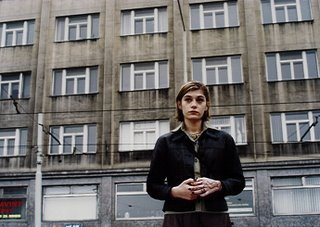 Labina in Loners (Samotári) as the 'spaced-out' Vesna
Labina in Loners (Samotári) as the 'spaced-out' Vesna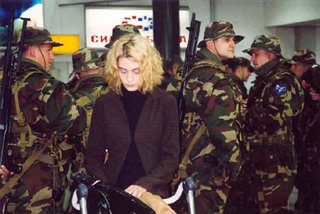 How I Killed a Saint: Labina as the troubled Viola back 'home' in Macedonia
How I Killed a Saint: Labina as the troubled Viola back 'home' in Macedonia How I Killed a Saint: Viola's patriotic and alienated brother Kokan
How I Killed a Saint: Viola's patriotic and alienated brother Kokan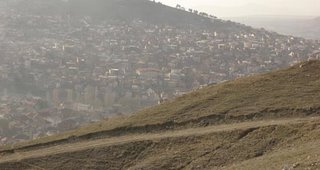 A panoramic POV shot from the forthcoming I am from Tito Veles (Jas sum od Titov Veles)
A panoramic POV shot from the forthcoming I am from Tito Veles (Jas sum od Titov Veles) 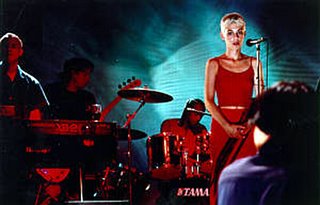 I Want You: Labina stars as the mysterious Smokey
I Want You: Labina stars as the mysterious Smokey
An interview with Krzysztof Krauze and Joanna Kos, director and co-writers of My Nikifor (Moj Nikifor)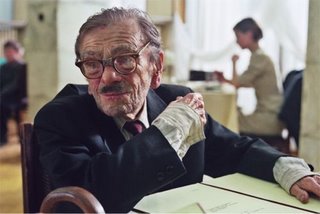 Krystyna Feldman changes gender for My Nikifor
Krystyna Feldman changes gender for My Nikifor
Krzysztof Krauze won a FIPRESCI Short Prize for the film Declination (Deklinacja) in 1978 in Cracow (his second short film) and he is very renowned in his native country. Joanna Kos was six at this time.
My Nikifor won the Globe at the Karlovy Vary Film Festival in July 2005, but couldn't subsequently be screened for eight months, even in Poland, as it was in a Category A Festival program. This unfortunately meant it couldn’t be shown at Cannes, Venice, Berlin, etc., as the strict rules dictated this. It was not even allowed to be screened in the Polish Film Institutes of other countries.
Krzysztof Krauze and Joanna Kos are not the producers of My Nikifor despite it being so much a personal project. Therefore, they were not responsible for the distribution of the film and couldn’t have a director’s final say on the cut.
(NOTE: As Joanna speaks much better English she tends to answer most of the questions but that is only after conferring with Krzysztof first)
Is this the first time you’ve co-scripted a film together?
JOANNA: Yes, but there is a short novel which we have just co-scripted and directed (called Saviour Square).
On My Nikifor, what, if any, disagreements you had with the script. What was the biggest disagreement?
JOANNA: The main problem is that usually we don’t want to write it at the same moment. The biggest problem is usually when you are writing the script. You are putting in all the emotions from real life in the script. I am usually writing the dialogues but Christopher (Krzysztof) is better in dramaturgy construction. Krzysztof usually writes from a male point of view and he has a very synthetic brain. That’s his strongest area. 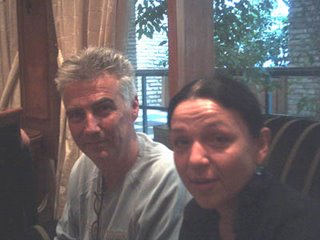 Krzysztof Krauze and Joanna Kos
Krzysztof Krauze and Joanna Kos
Joanna, you enjoy writing dialogue more?
JOANNA: It comes easier to me. Krzysztof tells me something and usually we put it onto the computer. We are now avoiding with this latest movie writing directly onto the Computer. The other part of the brain is working when you are writing by hand, not by writing directly onto the computer; we are convinced that this is true. I now only write directly onto the computer when I write for 30 second commercials.
You said it took 28 Days to shoot. What was the budget for the film?
Between $700-800,000.
Does that include post-production as well because that’s very cheap?
Yes it is, but with a comparatively different salary budget.
How have the Polish public accepted the film?
JOANNA: Krzysztof has his own audience in Poland because his previous films have been successful there. Debt was one of the most important movies of the last decade so his older audience really like him. My Nikifor had a different audience; it had lot of older people.
You say Nikifor was well-known in Paris?
In the early 1950's he had his first exhibition. Dina Vierna had a gallery and was one of the most important people for promoting native painters. Marc Chagall was also involved in this. If Dina Vierna made you an exhibition, it means people will likely buy the paintings. Nikifor’s paintings after Paris were also exhibited in Rotterdam, Amsterdam and London. Before the Second World War there was a group of painters from the Ukraine (The Capists) and Chagall was also supporting this group. They were very interested in Folk Art and apparently they exhibited before the Second World War and used a couple of Nikifor’s paintings which they chose that later were used in Paris.
Despite these exhibitions and his fame, it is true that Nikifor was still living on the streets?
Yes, because he had no idea, he couldn’t speak. Of course he was earning some money but he was also alone, he didn’t have any family. Until the 1960’s, people were of course trying to help him and to put him in some kind of dormitory in the hospital (Government funded) but he was running away. He didn’t want to stay in a dormitory.
So he was very stubborn?
Yes and this changed only when Marian Wlosinski came along and spent 14 hours a day taking care of him.
In the 60s, some of his paintings, particularly his watercolours were destroyed because of the TB (tuberculosis). Were there any important works lost?
I don’t know how many were lost. We are afraid that the best time in his painting career was before the war so many of these works were lost. He had his own wooden box which had a few hundred paintings, and this he didn’t want to sell because he knew they were from the best period of his painting and he knew this. Also, some of them he gave away in return for dinner, etc., and they were to turn up later in the 60’s.
Is there a permanent collection of any of his work in Poland?
Yes, there is a museum (the Nikifor Museum opened in 1995) of his work in a village that is close to Krynica. There are big also big collections in the United States and in Paris. There’s a good story about the Japanese producer who came to Karlovy Vary with his wife. He bought the movie for all the distribution fields and bought us presents. He then started to buy Nikifor’s paintings from the galleries around the world. He was such fun to meet and he fell in love with Nikifor’s paintings.
How did you get cinematographer Krzysztof Ptak to come on board for the film as he’s very famous and in demand?
He’s a very busy man but he’s also a good friend so that helps
The scenes in the snow were manipulated a little?
There was a lot of snow because it was the winter time in a place where you have winter for almost eight months. This is high definition so there was some pictures we could put together and this was the same with the snow. In some parts we were pasting the snow by computer. It was a small budget movie so we couldn’t wait for the snow.
You say the film was a 28 day shoot but how many days break?
It was shot over two months. We were waiting for the spring and then Krzysztof had a small accident in the Spring. There were 23 days of winter shoot and then we shot five days in spring.
How much does it cost to transfer the film onto 35mm?
Just for transferring the picture, not the music, was about €30,000.
That’s quite cheap?
Not in Poland.
What other festivals has My Nikifor played so far?
As well as Karlovy Vary, (it’s played) Vancouver, Montreal, Reykjavik, Bordeaux, but not everywhere in competition, and honestly we don’t where exactly. We have three copies (in circulation) two with English subtitles and one in French. We also have an invitation from Strasbourg…
As far as you know, the film hasn’t played in Britain yet?
Not yet but we have had invitations from Cardiff and maybe London. I should check this. We can’t go though because we are going to Valladolid and then we have two weeks break and then we are going to Strasbourg for some European Parliament screenings. Then it’s Damascus. Tomorrow we are going to Chicago and then to the Mill Valley Film festival. Chicago is showing the first screening of the festival. We only choose nice film festivals to go to, in nice places.